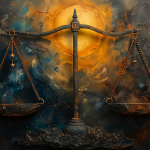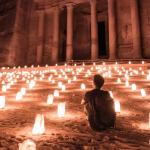I’ve spent much of the pandemic contemplating the meaning of the biblical Garden of Eden story that instills the mythological framework for Western Christian epistemology. Do we trust our bodies to tell us intuitively the truth about our world or are we supposed to submit our innately flawed personal intuitive experience to the orthodoxies of authoritarian institutions like the church that convey the knowledge of good and evil to us? This is the quarrel that Western Christianity has had with the indigenous nations it tried to wipe off the face of the earth for much of the past five hundred years of Christian colonialism. It’s also the quarrel Texas governor Greg Abbott is currently having with the families of transgender seven year olds in his state.
The Augustinian original sin doctrine derived from the Adam and Eve story has taught Western Christians to presume our bodily intuition is unreliably sinful so we need to submit ourselves to external authority, which is a core presumption Western culture has carried into everything from its scientific method to its nation-state design, even as it has secularized beyond its Christian mythological origin.
Modern Western society, with some historical dissent, has tended to presume that only strong, centralized nation-states with widely respected, standardized social norms and robustly authoritarian criminal justice systems can prevent society from devolving into the chaotic “war of all against all” that Hobbes warned us about. I just finished reading an excellent book by David Graeber and David Wengrow called The Dawn Of Everything which calls a lot of Western presumptions about the need for authoritarian governance into question. They share example after example of societies throughout history in which large populations of people were able to live peacefully in close proximity with one another without having written codified laws or authoritarian leaders.
So here’s the great irony I see in the Eden story. I think that Eden is an ingenious parable about religious authority, specifically narrating the way that religious authority’s imposition of its “knowledge of good and evil” (symbolically represented by the serpent’s offer of the fruit to Adam and Eve) kills off the natural intuitive connection humans otherwise had with divinity. The myth of Eden prophesies its own abuse as a story by the mythological serpent who became the chief interpreter of the story.
The serpent tells Adam and Eve that the knowledge of good and evil is the way to divinity (“you will become like God”). But it’s actually the way their divinity dies, which is why in the story God told Adam and Eve they would “die on the day they ate the fruit.” They don’t physically die so it seems like God is the liar, but their divinity dies because the knowledge of good and evil represented symbolically by the fruit they eat in the story ruins the intuitive intimacy they had with God as human branches on the maternal vine of divine consciousness.
The fall of humanity is the spiritual death of no longer being entirely enveloped by divinity as creatures harmoniously synchronized within an ecosystem, akin to the moment an infant leaves its mother’s womb and screams in its newly naked vulnerability as a fully separated body. Up until Adam and Eve eat the fruit, their nakedness has no meaning since they are intuitively connected to the entirety of nature as an integrated part of the divine embodiment of everything. The universe had been the body they shared with everything else.
The story says allegorically that the knowledge of good and evil is how humanity’s eyes are “opened” to our “nakedness.” This is a mythological representation of a process that happened over thousands of years with great cultural and geographic variance. Humans gradually discovered the vulnerability of their nakedness both physically and metaphorically, they gained an awareness of their individuality as bodies that need to be protected from the elements around them, and they lost the immortality they had shared with the universe when they were simply an undifferentiated part of the whole.
I don’t think any of this was avoidable. To me, the allegory of the Garden of Eden story articulates a tremendously important paradox about human spiritual evolution. We separate ourselves from divinity the more we externalize divinity by building authoritarian infrastructures around it like sacred books holding the knowledge of good and evil that is the serpent’s fruit, and the formidable, trillion dollar institutions that control the interpretation of these sacred books.
I am proposing that the Garden of Eden is not a story about how humans are hopelessly flawed and doomed by nature because of a historical mistake made by a single universal ancestor whose original sin forces us to seek salvation from eternal torture in our submission to an authoritarian religious institution that represents God. Instead, the Garden of Eden is an allegory about how authoritarian religious institutions trick humans into letting them speak for God.
Authoritarian religious institutions are the serpents who offer the knowledge of good and evil in the form of their sacred books and the sermons they preach about them. In mythology, the serpent is usually the animal chosen to symbolize divine wisdom, perhaps because the pursuit of spiritual wisdom is as dangerous as petting a snake who can bite you and poison you with narcissism as you disingenuously hide your own power as a religious authority beneath a public veneer of absolute obedience to a patriarchal authoritarian God whose proclivities are designed to validate your authority.
Essential to the traditional Western Christian interpretation of the Eden story is to retroactively superimpose our anthropomorphic patriarchal authoritarian God onto the story and to make the plot entirely about Adam and Eve disobeying their patriarchal authoritarian God instead of the trickery of the serpent who used the knowledge of good and evil to wrap his coils around humanity and become a patriarchal authoritarian “prince of this world” masquerading as God, which is how humanity fell from grace.
The one Jesus calls the prince of this world is not God, but is he not the one we have allowed to represent God to us? That is to say, has Western Christianity not built its God largely in the image of the most powerful white men in our history rather than the brown man whose complete dehumanization was the original foundation of the Christian movement? What if the Western conception of God as a patriarchal marble statue of impassive omnipotence who sits on a throne outside of time in control of everything is itself a byproduct of the deception of religious authority represented by the serpent in the story of Eden?
Why can’t we call God a mother whose body is the universe that gives birth to all reality instead of a father who is categorically other to the universe he created once a long time ago? Why can’t we call God the cosmic consciousness that constantly evolves through its experience of the universe it is constantly creating? Why does God have to be the ultimate eternal patriarch who is completely unsullied by time and matter and impenetrably perfect to a Platonist cosmology?
What if the salvation of Jesus’ cross actually happens in God’s self-discovery and self-empowerment experienced through our lives as God gets tired of being crucified over and over again in our bodies since two thousand years of Christians living out that story has failed to win us over to the divine love that stops driving nails into the hands and feet of every prophet? What if love itself is the thing that gets crucified, and whenever we hurt, it is love itself getting hurt in our bodies? What if we are love itself at our core and the ego attachments that hide this truth from us, including our intellectualized religious beliefs, are themselves the “things of this world” that we need to be liberated from?
What if God is “waking up” as more and more humans gain an unjustifiable but intuitively compelling sense of divine anointing that untangles them from their blind commitment to the reified authoritarian premises that structure modern global society, meaning that they are leaving behind the absolute truths of taboo-based moral normativities and replacing them with the intuitive guidance of love in attentive, well-boundaried, consensual friendship with others? What if atheists are right to say the universe does not have a puppetmaster but wrong to conclude that means there cannot be a God since we can simply use “God” as a label for the love we find in the universe that pursues synchronicity and beauty through us as it tunes every ecosystem into deeper harmony?
I realize this is all just my intuition speaking without justification. Who gives me the authority to raise rhetorical questions like this? No one. Considering the implications of these questions, it makes sense to me that mystical intuition is the most dangerous enemy of religious authority. I imagine that my words display a rebellious, adolescent kind of hubris to religious authority figures. As an autistic, I’m used to being infantilized and pathologized when I sincerely share my intuition with others. Sometimes I wonder if autism is most generally a “disorder” of trusting one’s own personal intuition instead of conforming to the social norms that we cannot seem to obey authentically.
I’m sure I will get some flak for writing this. But I don’t think I’m doing anything different than humans have always been doing. We have always been writing the story of God, which is how God writes her own story. She speaks into our intuition, in a relationship which is often only discovered through years of fasting and praying that refine our ability to hear the most subtle voice in the universe.
We need to be honest about the fact that when we use the word God, we’re just using a label for the divine mystery beneath the universe. What if the labels Father, Son, and Holy Spirit describe our dead Ancestors, the Living who carry their dreams forward, and the Love they share between them? Jesus and the apostle Paul both talked as though they were inviting us into an intuitive alignment with the divine, not different than what Jesus himself experienced and what Paul discovered and exhorted us to imitate, a life of the spirit rather than a life of walking on eggshells under the watchful eye of authoritarian religious institutions. Do you actually believe your body is a temple of the Holy Spirit in which Christ lives or do you think the apostle Paul was using purely metaphorical figures of speech?
I don’t think it’s wrong, reckless, or unprofessional to share wild, intuitive speculations about God. But I also don’t think anyone’s personal intuitions are authoritative until a spiritual community tests and refines them into collectively generated mythology to anchor its collective spiritual life. I don’t think that the fact that we need to refine our spiritual intuition in community means that communities should submit themselves forever to the intuition of the past. Just because the imperial church decided to close its canon of authoritative divine truth does not mean that God has stopped her long, slow process of democratizing her divinity through the witness of the eternal lamb who has never stopped being crucified by religious authority.
What if the age of the spirit is an age in which humanity decides to take a rest from pursuing the knowledge of good and evil in the form of intellectual arguments about religious doctrine that have dominated Western Christianity for most of its existence? What if we started worshiping in ways that weren’t focused on correctly articulating doctrine but instead concerned with discovering our fully embodied anointing as divine children who are coming into our true nature as Christ breathes resurrection into us? What if being crucified and resurrected with Christ is about trusting God’s intuitive word in each of our hearts despite whatever persecution our presumptuous democratization of divinity provokes from patriarchal religious authority that refuses to let go of its power like a serpent coiled around the whole of humanity?
I just think that it’s okay for us to start telling new stories about God that learn from the past stories about God that are causing our world to suck right now whether it’s because Vladimir the Great is rebuilding his empire with Russian Orthodoxy’s blessing or because Governor Abbott is cynically playing on the sensibilities of evangelical culture warriors by calling it child abuse when Texas parents honor their transgender children’s bodily intuition. Christians have always been making up our religion as we go along even though we pretend that our sacred book dropped from the sky at the beginning of time, because religion has always been a collective intuitive process of mythmaking. Perhaps it’s time to start writing our intuitive collective myths more honestly and openly.















